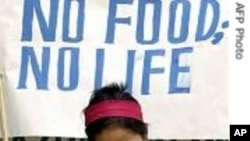Click here for Lao version/ຄລິກບ່ອນນີ້ເພື່ອອ່ານພາສາລາວ
<!-- IMAGE -->"The effects of chronic
hunger cannot be overstated," said Secretary of State Hillary Rodham
Clinton. "Hunger is not only a physical condition, it is a drain on
economic development, a threat to global security, a barrier to health and education,
and a trap for the millions of people worldwide who work from sunup to sundown
every single day but can barely produce enough food to sustain their lives and
the lives of their families."
Among those in the forefront of the fight against world hunger is an Ethiopian
scientist, Dr. Gebisa Ejeta. On June 11th, Secretary of State Clinton announced
that Dr. Ejeta will be awarded the World Food Prize for 2009. Since 1986, the
World Food Prize Foundation has honored outstanding individuals with this
award, recognizing those who have made vital contributions to improving the
world's food supply. This year's recipient was recognized for developing
sorghum hybrids resistant to drought and the devastating Striga weed, for his
work in creating thriving local markets, and his efforts to train farmers in
new techniques of agriculture. "Dr Ejeta began his journey in a hut in
Ethiopia, where he was born to a mother who was passionately committed to his
education," said Secretary Clinton. "Now, he reminds us that a system
of agriculture that nourishes all humankind requires more than a single
breakthrough or advances in a single field. It requires a sustained and
comprehensive approach," she said.
The United States, said Secretary Clinton, is committed to providing leadership
in developing a new global approach to hunger. The U.S., she said, has
identified seven principles that support sustainable systems of agriculture in
rural areas worldwide.
The U.S. will seek to increase agricultural productivity; work to stimulate the
private sector by improving the storage and processing of foods and improving
rural roads and transportation; support efforts to maintain natural resources
so that land can be farmed by future generations and adapt to climate change;
expand knowledge and training by supporting research and development; seek to
increase trade; support policy reform and good governance; and support women
and families.
For the United States, said Secretary Clinton, "sustainable agriculture
won't be a side project. It is a central element of our foreign policy."





